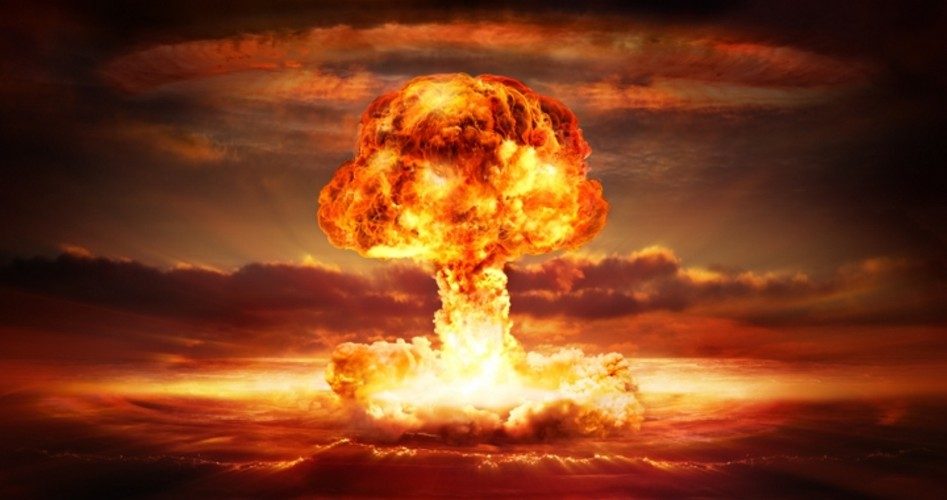
In the wake of the attempted murder of a former Russian spy and the murder of a Russian businessman, the Russian Bear is showing its true colors. With indications that the Kremlin is behind the nerve agent poisoning of Sergei Skripal and his daughter as well as the murder of Nikolai Glushkov, Russia threatened the UK — where both attacks took place — with nuclear war.
As The New American reported last week, Skripal and his daughter Yulia were found slumped over on a park bench in Salisbury, England. They had been poisoned by a deadly nerve agent. The two survived, but it was a close call. As James Donlon wrote in that article:
Skripal, a former spy and officer, is — not coincidentally — considered a traitor in his home country of Russia, after being convicted in a Russian court of selling state secrets to the British. After being imprisoned for four years, he was sent to Britain as part of a prisoner exchange between the Russian and British governments.
The attack has immediately attracted world attention, and it brings back to mind the brutal assassination of Alexander Litvinenko, in 2006, after the Russian was fatally poisoned by a rare radioactive metal. That poison is was thought to have been administered through a teapot. In 2016, a UK inquiry into Litvinenko’s murder found that it was “probable” that the poisoning was carried out at the direction of the Russian FSB and that it was “probably approved” by the head of the FSB and Putin.
It is now believed that the deadly nerve agent Novichok was planted in Yulia’s luggage before she left Moscow to visit her father in England. When she unpacked, she unknowingly acted as a conduit for the Kremlin to poison her father. She was merely collateral damage.
On March 13, British Prime Minister Theresa May responded to the use of a chemical agent to poison a man and his daughter on British soil by giving Russia 24 hours to answer claims that it was “highly likely” that the Kremlin was behind the attack. There were implications British intelligence agencies would launch a major cyberattack against Russia in retaliation.
The Russian Bear — having been poked — issued its own warning: First, the Russian embassy in London put out a series of tweets including one saying, “Any threat to take ‘punitive’ measures against Russia will meet with a response. The British side should be aware of that.” Then, as if to clarify the threat of “response,” Russian Foreign Ministry spokeswoman Maria Zakharova issued a statement, saying in part, “Who does Britain think it is, issuing ultimatums to a nuclear power?”
Well, that escalated quickly.
In the midst of all of this, it appears the Kremlin has continued its practice of murdering Russians living in the UK. On Monday, Russian businessman Nikolay Alekseevich Glushkov was found dead at his London home with strangulation marks on his neck.
In the 1990s, Glushkov had been deputy general director of the Russian airline company Aeroflot. He discovered that the company was being used as a “cash cow” to fund international espionage operations, with roughly 20 percent of the 14,000 employees being FSB, SVR, or GRU officers. He also found that funds derived from ticket sales were transferred to hundreds of foreign banks where the Aeroflot administration could not access them. He closed those accounts, transferred the funds to a Swiss company, and sent the SVR and FSB letters telling them that they were responsible for paying the salaries of the officers working for them.
He was arrested and given a suspended sentence. He escaped to the UK in 2006 and was granted political asylum. In 2016, the UK refused to extradite Glushkov to Russia, and in 2017, he was convicted in absentia by a Russian court of embezzling $123 million from Aeroflot. He was sentenced to eight years in prison, but remained in London.
Glushkov had stated that he feared being put on “Putin’s hit list” and that he expected that he was a target for assassination. There are strong indications that his dire prediction came true. Soon after his body was discovered, it was announced that the counter-terrorism command would lead the investigation into his murder.
And there is another connection that puts Glushkov’s murder in a harsh Red light: In 2001, while he was imprisoned in Russia awaiting his initial trial, he was hospitalized for a short while. During that time, he was offered an opportunity to escape. That plan was put in place by Andrey Lugovoy. Glushkov, believing the “escape” to be an FSB set-up, did not go along.
Andrey Lugovoy is the Russain spy wanted by British authorities for suspicion of the 2006 radioactive poisoning of Alexander Litvinenko. Lugovoy has a long history with Russian intelligence, dating back to his days with the KGB. He, like many other KGB operatives, made the transition to the FSB when the KGB was dismantled in the wake of the failed 1991 coup.
Given that Lugovoy appears to have attempted to set Glushkov up in 2001, and that he likely murdered Litvinenko in 2006, the murder of Glushkov — coming one week after the attempted murder of Skripal and his daughter — seems to point to Putin’s regime. And the Russian response to threats of “punitive” measures by the British government shows that the Russian Bear has not changed at all over the last 30 years.
Poisonings and strangulations of Russians living in the UK and a not-so-veiled threat of nuclear war serve as indications that the Cold War — long thought to be a thing of the past — may be heating up again.
Photo: RomoloTavan/iStock/Getty Images Plus



